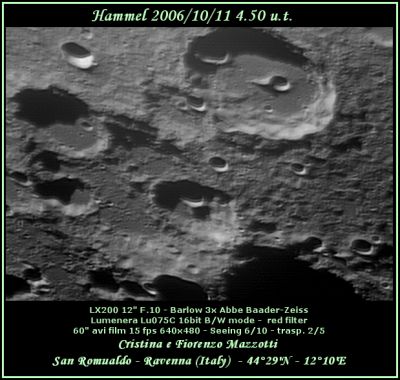Difference between revisions of "Hommel"
(Created page with "<div id="content_view" class="wiki" style="display: block"> =Hommel= {| class="wiki_table" | Lat: 54.7°S, Long: 33.8°E, Diam: 126 km, Depth: 5.05 km, [/R%C3%BCkl%2075 R...") |
|||
| Line 3: | Line 3: | ||
{| class="wiki_table" | {| class="wiki_table" | ||
| | | | ||
| − | Lat: 54.7°S, Long: 33.8°E, Diam: 126 km, Depth: 5.05 km, [ | + | Lat: 54.7°S, Long: 33.8°E, Diam: 126 km, Depth: 5.05 km, [[R%C3%BCkl%2075|Rükl: 75]]<br /> |
|} | |} | ||
<div id="toc"> | <div id="toc"> | ||
| Line 11: | Line 11: | ||
[http://www.lpod.org/coppermine/thumbnails.php?album=search&type=full&search=Hommel LPOD Photo Gallery] [http://www.lpi.usra.edu/resources/lunar_orbiter/bin/srch_nam.shtml?Hommel%7C0 Lunar Orbiter Images] [http://www.lpi.usra.edu/resources/apollo/search/feature/?feature=Hommel Apollo Images]<br /> <br /> | [http://www.lpod.org/coppermine/thumbnails.php?album=search&type=full&search=Hommel LPOD Photo Gallery] [http://www.lpi.usra.edu/resources/lunar_orbiter/bin/srch_nam.shtml?Hommel%7C0 Lunar Orbiter Images] [http://www.lpi.usra.edu/resources/apollo/search/feature/?feature=Hommel Apollo Images]<br /> <br /> | ||
==Maps== | ==Maps== | ||
| − | ''([ | + | ''([[LAC%20zone|LAC zone]] 127B3)'' [http://www.lpi.usra.edu/resources/mapcatalog/LAC/lac127/ LAC map] [http://www.lpi.usra.edu/resources/mapcatalog/usgs/I702/ Geologic map]<br /> <br /> |
==Description== | ==Description== | ||
<br /> <br /> | <br /> <br /> | ||
==Description: Elger== | ==Description: Elger== | ||
| − | ''([ | + | ''([[IAU%20Directions|IAU Directions]])'' HOMMEL.--Adjoins [[Vlacq|Vlacq]] on the S. It is a somewhat larger and a far more irregular formation. On every side except the E., where the border is unbroken, and descends with a gentle slope to the dark interior; ring- plains and smaller depressions encroach on its outline, perhaps the most remarkable being Hommel <u>a</u> on the N., which has an especially brilliant wall, that includes a conspicuous central mountain, a large crater, and other details. The best phase for observing Hommel and its surroundings is when the E. wall is just within the evening terminator.<br /> <br /> |
==Description: Wikipedia== | ==Description: Wikipedia== | ||
[http://en.wikipedia.org/wiki/Hommel_(crater) Hommel]<br /> <br /> | [http://en.wikipedia.org/wiki/Hommel_(crater) Hommel]<br /> <br /> | ||
==Additional Information== | ==Additional Information== | ||
| − | Depth data from [ | + | Depth data from [[Kurt%20Fisher%20crater%20depths|Kurt Fisher database]]<br /> |
* Westfall, 2000: 5.05 km | * Westfall, 2000: 5.05 km | ||
* Cherrington, 1969: 2.8 km | * Cherrington, 1969: 2.8 km | ||
| − | * Satellite craters Hommel A, J and R are on the [ | + | * Satellite craters Hommel A, J and R are on the [[ALPO%20list%20of%20bright%20ray%20craters|ALPO list of bright ray craters]]. |
<br /> | <br /> | ||
==Nomenclature== | ==Nomenclature== | ||
| − | * Named for [http://en.wikipedia.org/wiki/Johann_Hommel Johann Hommel] (1518 - 1562), a German astronomer and mathematician. In 1552 or 1553, Richard Cantzlar introduced transversal dot lines in graduations. It was a variant of the zigzag line system introduced by Hommel. [ | + | * Named for [http://en.wikipedia.org/wiki/Johann_Hommel Johann Hommel] (1518 - 1562), a German astronomer and mathematician. In 1552 or 1553, Richard Cantzlar introduced transversal dot lines in graduations. It was a variant of the zigzag line system introduced by Hommel. [[Tycho|Tycho]] Brahe obtained the zigzag line system from Hommel. |
| − | * According to ''[ | + | * According to ''[[Whitaker|Whitaker]]'' (p. 213), this name was introduced (in the form '''Homelius''') by [[Riccioli|Riccioli]]; however the feature labeled with that name on Riccioli's map is what we now call [[Pitiscus|Pitiscus]]. When, and by whom, the name '''Hommel''' became associated with the present feature is not entirely clear (from Whitaker's book). <span class="membersnap">- [http://www.wikispaces.com/user/view/JimMosher [[Image:JimMosher-lg.jpg|16px|JimMosher]]] [http://www.wikispaces.com/user/view/JimMosher JimMosher]</span> |
<br /> | <br /> | ||
==LPOD Articles== | ==LPOD Articles== | ||
Revision as of 15:52, 15 April 2018
Contents
Hommel
|
Lat: 54.7°S, Long: 33.8°E, Diam: 126 km, Depth: 5.05 km, Rükl: 75 |
Table of Contents

Cristina Cellini Large crater on the left, almost covered by smaller craters!
Images
LPOD Photo Gallery Lunar Orbiter Images Apollo Images
Maps
(LAC zone 127B3) LAC map Geologic map
Description
Description: Elger
(IAU Directions) HOMMEL.--Adjoins Vlacq on the S. It is a somewhat larger and a far more irregular formation. On every side except the E., where the border is unbroken, and descends with a gentle slope to the dark interior; ring- plains and smaller depressions encroach on its outline, perhaps the most remarkable being Hommel a on the N., which has an especially brilliant wall, that includes a conspicuous central mountain, a large crater, and other details. The best phase for observing Hommel and its surroundings is when the E. wall is just within the evening terminator.
Description: Wikipedia
Additional Information
Depth data from Kurt Fisher database
- Westfall, 2000: 5.05 km
- Cherrington, 1969: 2.8 km
- Satellite craters Hommel A, J and R are on the ALPO list of bright ray craters.
Nomenclature
- Named for Johann Hommel (1518 - 1562), a German astronomer and mathematician. In 1552 or 1553, Richard Cantzlar introduced transversal dot lines in graduations. It was a variant of the zigzag line system introduced by Hommel. Tycho Brahe obtained the zigzag line system from Hommel.
- According to Whitaker (p. 213), this name was introduced (in the form Homelius) by Riccioli; however the feature labeled with that name on Riccioli's map is what we now call Pitiscus. When, and by whom, the name Hommel became associated with the present feature is not entirely clear (from Whitaker's book). - JimMosher JimMosher
LPOD Articles
Bibliography
A Portfolio of Lunar Drawings (Harold Hill), pages 194, 195.
This page has been edited 1 times. The last modification was made by - tychocrater tychocrater on Jun 13, 2009 3:24 pm - afx3u2